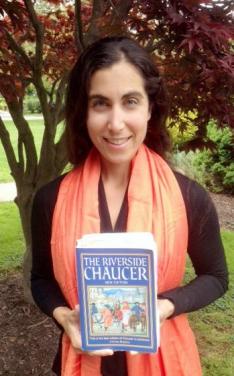Princeton’s capstone project left a lasting impression on Christine Galib ’08, who delved into the works of Chaucer, and Tim James ’78, who interviewed political leaders in New York state.

PAW Tracks is also available on iTunes — click here to subscribe
TRANSCRIPT
Writing the senior thesis is one the quintessential Princeton experiences: Months of research and exploration come together in a single document.
In this episode of PAW Tracks, two alumni share their thesis memories. We begin with Christine Galib ’08, who wrote her thesis about Chaucer’s Canterbury Tales.
Galib: I’ve always loved reading, and I’ve loved fairy tales and fables. The whole literature world has always intrigued me. So I specifically chose Princeton as an undergraduate school because I wanted to write the thesis. Junior year I took a few seminars with Professor Sarah Anderson. I loved working with her. I loved every minute of working with her. That process started with my junior seminar. I studied abroad in the spring. I went to St. Andrews in Scotland. Just like we’re Skyping now, I would Skype with Sarah very frequently to focus on my research, which started with C.S. Lewis and The Chronicles of Narnia and then slowly merged back into the classics, a lot of Latin, a lot of Middle English, a lot of Chaucer, and then focused specifically the summer between my junior and senior year on The Canterbury Tales.
I think once someone starts reading Chaucer they never want to stop. I should speak in “I” statements though. Once I started reading Chaucer, I never wanted to stop. I did a lot of research in Saint Andrews over the summer between the junior spring and the senior fall, and then my carrel in Firestone Library during my senior year was my home. When you move in to a carrel, you move into a carrel. Don’t tell the Firestone staff, but we definitely brought dinner into that carrel. I was surrounded by thousands of books on Chaucer, and everything was right there, so I didn’t have to move and relocate and take my thousand books with me. I knew exactly where the books were. I could just be writing and then reach and get my book, open the page, put it back, grab the other book in the other stack, put it down, find another book, so that experience was very contained. Everything I needed was in that carrel, and there was absolutely no reason to leave. It was a very intellectual experience. As a writer, you find a place and you constantly seek inspiration from places, so the whole act of writing the thesis and researching is tied very much to the place in which I did that.
I tend to write a lot. With Chaucer, I’m not the first person to write about Chaucer, and I certainly won’t be the last. I remember Sarah saying, “Your thesis has a page limit, and you can’t go over it, so you need to start cutting.” That was heartbreaking to me because I would turn in chapters and chapters and chapters, and she said, “You aren’t writing a dissertation. You’re writing an undergraduate thesis.” But I think that little exchange was a testament to how much she inspired me to go beyond the level-one analysis, or the, “I’m just writing this paper to turn it in.” Her comments and her feedback, which there were a lot of comments and a lot of feedback, really inspired me to not settle with a sub-par version of my work. She pushed me to develop something that I was really proud of and to cut a lot of words. There is no feeling in the world such as holding a work that really is your baby that you’ve become so familiar with, and invested so much into, holding it in its bound copy. I think that’s a very gratifying feeling, and I was really proud of my work. I was proud of the relationships that had gotten me to that work, and proud of the whole experience of writing it.
Tim James ’78 was a reporter for The Daily Princetonian, and for his politics thesis, he ventured away from the archives to interview some of the elected officials he was writing about — with memorable results.
James: The subject of my thesis was the New York State Liberal Party and its strategy for affecting politics, mainly through its influence on the major parties, on the Democrats and the Republicans, by at different times allying different ways. I remembered – very memorable day of my life – I interviewed Henry Stern, who was a member of the Liberal Party. I knew who he was already. He was a city councilman for Manhattan, who had gotten elected as a councilman at large on the Liberal Party line. At that time, New York City had, in addition to 33, I think, district seats, 10 councilmembers at large, 2 from each borough. Each party could only run one, so it was a guarantee of minority party representation, which mostly you would expect to mean Republicans, but in Manhattan it could be a Liberal Party member instead. He had been elected in ’73, and then was reelected in ’77. I interviewed him February ’78, and I would later work for him.
Actually in my interview, it’s funny, I was very annoyed with him at the time because I pictured he was going to dedicate an hour, hour and a half to just talking with me. He’s a very hyperactive kind of guy. He doesn’t spend an hour focusing on one thing ever, as I would later know. Really what happened was I spent quite a few hours with him as he went through the paces of his day, and as he could, would talk to me for 5 minutes here, 15 minutes there, take another phone call, turn back and ask what we were talking about. I was very annoyed by it at the time, but afterward I realized what an amazing day it had been because I may remember that day better than any day in my life. Here I was, I was 21, very interested in politics, had followed it a lot in the news whether newspapers or the TV news. I had been involved already to a limited extent obviously. But this was the first time I had ever spent a day with a working politician and went right through his day.
He was dealing with a lot. He was in an interesting position because this was February ’78, the second month of Ed Koch’s administration. Henry Stern had in the previous (administration?) been a kind of professional outsider. He and Ed Koch were good friends, so all of a sudden he was an insider and a player, so there were things that happened that day. I actually went over to city hall. There was behind the scenes stuff at city hall, and he drew me into a discussion with one of the aides at city hall. I said something to him. He told me about a situation going on then, and I made a comment about how they might handle it, making an analogy to the way Bobby Kennedy had suggested handling something during the Cuban Missile Crisis. Henry thought that was great, and he went back to the aide and said, “Here, why don’t you hear what Tim thinks about how you might handle this?” So in retrospect it was a very memorable day that came from doing my thesis. At the end of the day, I remember Henry escorted me out to the elevator outside his office, and he knew I was graduating, said “I imagine I’ll be – I don’t know if he said hearing from you or hearing about you.” But in fact a few months later, I was working for another New York City councilmember on that same floor and attending meetings in his office, and then later I worked for him at the New York City Parks Department in the ’90s.
Our thanks to Tim James and Christine Galib for sharing their stories. Brett Tomlinson produced this episode. The music is licensed from FirstCom Music.
Editor’s note: Tim James’ interview was recorded in 2013 as part of PAW’s Class of 1978 oral history project at Reunions.

